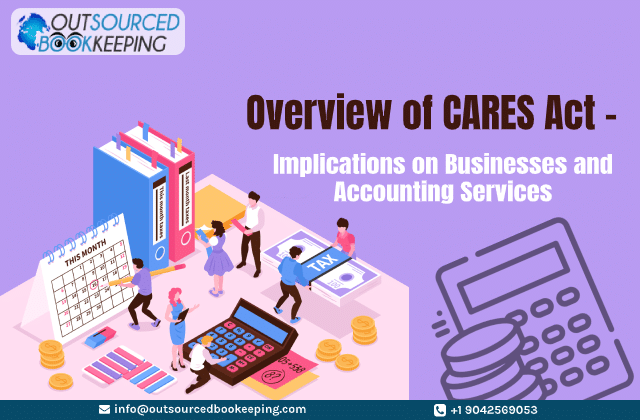Congress has passed the much-awaited Coronavirus Aid, Relief & Economic Security Act (CARES Act) to help individuals and businesses severely affected by economic damage that ensued due to the Coronavirus pandemic.
The CARES Act entails a $2.2 Trillion emergency relief package that is infused into the economy by providing economic relief and aid to American households, small businesses, financial markets, and state governments.

Right now, this CARES act is a lifeline to American households and small and large businesses. Want to know how? Read on:
A brief overview of the CARES Act:
It is a common practice to stimulate the slumped economy by sanctioning a stimulus package, just like it was done in 2009. But today’s health crisis created Corona pandemic has disrupted the American economy at an unprecedented level like never before. The social distancing and gradual lockdown measures taken by the government have broken the back of household consumptions, supply & demand chains & financial markets.
CARES Act – An Economic Relief Package for American Economy:
The CARES act is an economic relief package which is aimed at keeping the economy afloat akin to providing a life jacket to people in unreliable waters as a safety measure. This emergency relief package aims to provide this life jacket to individuals, small & large businesses, governments, and industries. In three phases, the $2.2 trillion loans will be infused into the economy in the form of unemployment benefits, assistance to healthcare providers, loans & grants for small businesses, a loan guaranteed for large businesses, state & local governments, reduction in individual and business taxes, support for industries and transportation providers & disaster responses, etc.
CARES Act – Implications for Businesses:
The $377 billion allocated towards the relief measures of the small business will be used by the govt. to mitigate the economic damage incurred due to the pandemic with:
Paycheck Protection Program: Under PPP, direct incentives in the form of loans will be provided for the small businesses, to help them run their businesses without employee lay off. The lender (SBA) will forgive the loans taken by the businesses in the event all employees continue on the payroll for at least 8 weeks and the loan amount is used towards rent, payroll, utilities or mortgage.
Emergency Economic Disaster Loan & Grant: EEDL allows the small business owners are eligible to apply for the Economic Disaster Loan to recuperate their business losses, with an easy qualification and low-interest. The Act also allows the eligible applicants to request an advance of up to $10,000 on this loan. As this advance comes under the grant, even if the applicant is not approved of the emergency loan, the advanced need not be paid.
CARES Act – Business Income Tax Provisions:
Employers whose business is partially or fully suspended due to the coronavirus pandemic are eligible for the payroll tax credit if they continue to pay their employees. The tax credit is capped at $5000/employee with 50% of qualified paid wages. For companies with more than 100 employees’ eligible wages are wages paid to employees whose work is affected by the business suspension. For companies with fewer than 100 employees all the wages come under credit.
- Employers can delay paying the payroll tax. 50% of the tax will be due by Dec 31, 2021, and remaining half by Dec 31, 2022.
- Net Operating Losses which are generally offset 80% of the taxable income are now allowed to offset 100% of the taxable income the year 2020.
- NOLs in 2018, 2019, and 2020 can now be carried back up to 5 years.
- Interest expense which is previously limited to 30% of the taxable income is now increased to 50% for 2019 & 2020.
- AMT credits can now be accelerated to claim all of them at once.
- Limit on claiming business losses for a single or married couple are suspended from the 2018 tax year.
In addition to the above relief measures, SBA express bridge loans, Funding for entrepreneurial development & state trade expansion, matching fund waivers for development agencies and business centres, subsidy for certain loan payments, cheaper and faster bankruptcy options are some of the measures taken under CARES Act to help small business during this pandemic.
Implications of the CARES Act on Accounting Services:
With an estimated $2.2 Trillion stimulus package, the CARES Act provides government loans and grants, significant tax and business tax incentives, investments and a slew of business provisions to stabilize the US economy and ensure its fast recovery.
This precautionary legislation impacts every taxpayer, and companies will certainly have their financial and accounting affected. Though the majority of the business measures will be reflected in the future periods, there are a few income tax account provisions that have to be reflected in the current period of enactment and with a change in NOL carry forwards, and the income taxes need a close assessment too. The affected companies should also closely monitor the developments regarding the tax relief and other business provisions as a few government loans and grants of the Act can impact the accounting and financial reports.
At Outsourced Bookkeeping our accounting experts not only help you with your renewed accounting and bookkeeping services in line with the current tax benefits but also help you with loan applications for the proposed Paycheck Protection Program, Emergency Economic Disaster Loan & Grant provisions successfully.
For any help regarding the accounting and financial services or loan applications to recuperate your business affected by the Corona pandemic. You can contact us here: https://outsourcedbookeeping.com








